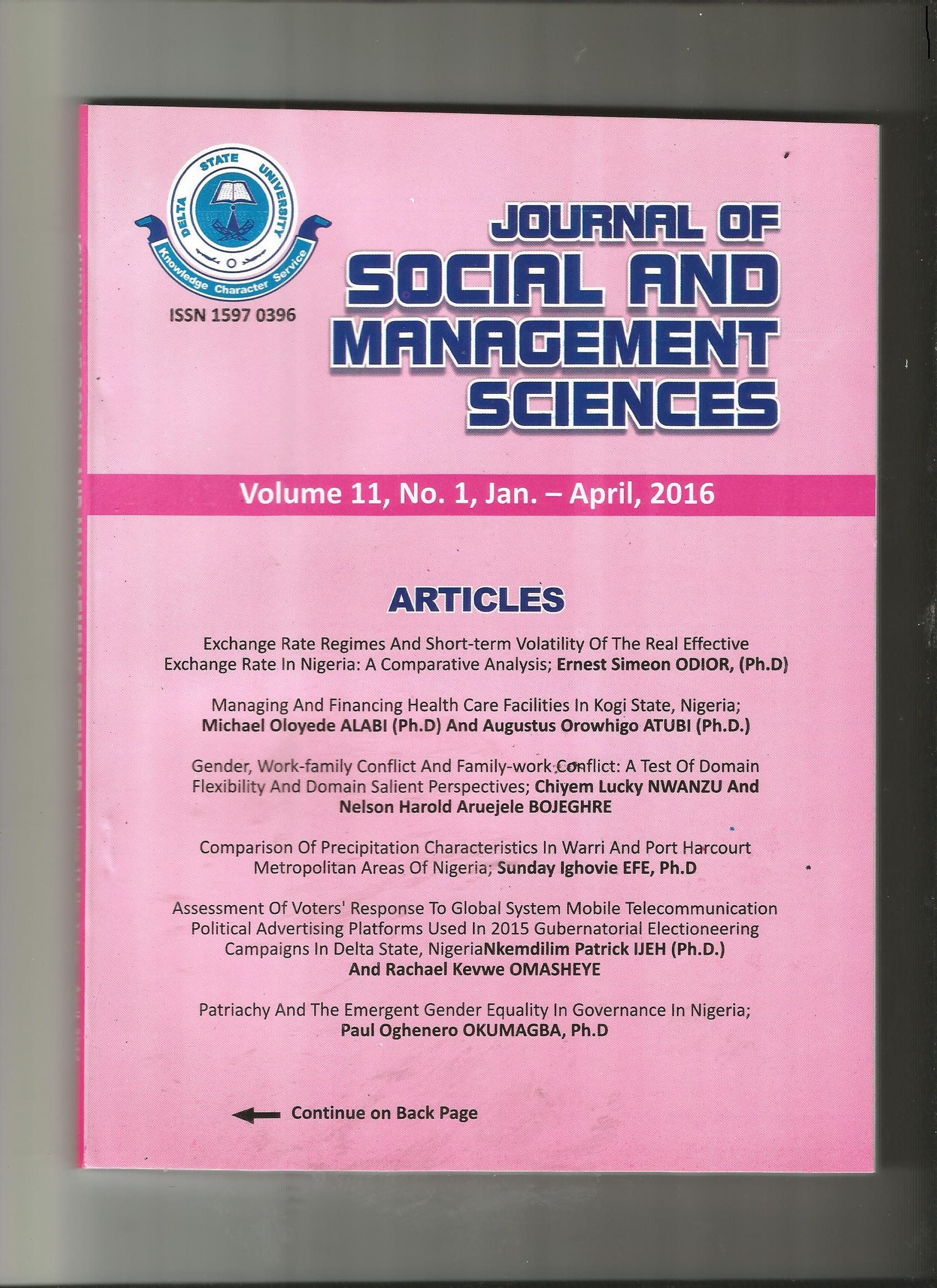
JOURNAL OF SOCIAL AND MANAGEMENT SCIENCES
Journal of the Faculty of Social Sciences, Delta State University, Abraka, Nigeria
ISSN: 1597-0396
DOI: 10.5987/UJ-JSMS
Email: jsms@universityjournals.org
ACCOUNTING INFORMATION AND THE PERFORMANCE OF SELECTED ORGANISATIONS IN RIVERS STATE.
DOI: 10.5987/UJ-JSMS.17.045.3 | Article Number: 2BFD674 | Vol.11 (3) - December 2016
Authors: CHRISTOPHER Solomon Iniobong and OGBONNA Gabriel Nkwazema
Keywords: Accounting information, Performance, Organisations
The study examined the impact of Accounting information and the performance of selected organisations in Rivers State, Nigeria. The study covers Genesis Group Nigeria Limited, Transcorp Hotels Plc, Seplat Petroleum Development Company, Orwell International Oil and Gas Limited, and Total Nigeria Limited all in Port- Harcourt, Rivers State, Nigeria. The data was obtained from primary source. The statistical method used was non-parametric test using Statistical Package for Social Science (SPSS 20.0). The result revealed obtained revealed that that the information generated by the accounting department have significant relationship in the production and decisions of the organization and Accounting information fulfils the basic roles of cost minimization, proper allocation of scarce resources and improvement of efficiency. The study recommends that staff and management should continue to engage in seminar/ training in order to enhance their understanding on how to generate and use accounting information for decision making.
Ahoke S. Deepak. S. (2014). Advanced Financial Accounting” volume 1, 3rd Edition, New Dehi Taxman Allied Services Publishers. Pg 1-4.
Alattar, J. M. & Al-Khater, K. (2007). An empirical investigation of users' views on corporate annual reports in Qatar. International Journal of Commerce and Management. 17(4), 312-325.
Awoyemi E.O.A. (2015). Guide to Government Accounting and Internal Audit”, Onibonoje Press, Ibadan.
Ayuso, S., Rodríguez, M. A., García-Castro, R., Ariño, M. A. (2014). Maximizing Stakeholders' Interests: An Empirical Analysis of the Stakeholder Approach to Corporate Governance. Business & Society. 53(3), 414-439.
Barth, M. R., Braver, W. H., Hand, J. M. & Landsman, W. R. (1999). Accruals, Cash Flows, and Equity Values. Review of Accounting Studies. 4(3/4), 205-229.
Dainelli, F., Bini, L. & Giunta, F. (2013). Signaling strategies in annual reports: Evidence from the disclosure of performance indicators. Advances in Accounting. 29(2), 267-277.
Edward JID (2014). The Modern accountants hand books”. Home wood: Lonhowles Irwin Inc.
Isaac, NR (1984) Principles of accounting.
Freeman, R. E. (1984). Strategic management: A stakeholder approach. Boston: Pitman.
Jones, S., Romano, C. A. & Smyrnios, K. X. (2005). An Evaluation of the Decision Usefulness of Cash Flow Statements by Australian Reporting Entities. Accounting & Business Research. 25(98), 115-129.
Kothari, C.R (2004). Research Methodology Methods and Techniques. New Delhi, New Age International Publishers Limited.
Kwok, H. (2002). The effect of cash flow statement format on lenders' decisions. The International Journal of Accounting. 37(3), 347-632.
Lee, J. Cronback (1951). Coefficient Alpha and the Internal Structure of Test. Psychometrika. Vol 16, No 3.
March, J. G., H. A. Simon. 1958. Organizations. Wiley, New York.
Moore, C. B., Bell, R. G., Filatotchev, I. & Rasheed, A. A. (2012). Foreign IPO capital market choice: Understanding the institutional fit of corpora te gove rnanc e . S t ra te g i c Management Journal. 33(8), 914-937.
Nicolaou A (2014). A Contingency Model of Perceived Effectiveness in Accounting Information Systems: Organizational Coordination and Control Effects. International Journal of Accounting Information Systems, 1: 91 – 105.
Olannye, A.P (2006). Research Method for Business: A Building Approach. Lagos: Pee Jee Publications.
Philip. E. and Warre C.S (2013). Principles and management Accounting”. USA: South Western Publ icat ion Corporat ion. Publishers Lagos.
Phillips, R. (2013). Stakeholder Theory and Organizational Ethics. Williston, USA: Berrett-Koehler Publishers.
Reid GC, Smith JA (2000). The Impact of Contingencies on Management Accounting system development. Management Accounting. Res., 11(4): 427-450.
Reynold (N.Ed (2012). Principles of Accounting Japan.
Sajady H, Dastgir M & Nejad H.H (2013). Evaluation of the Effectiveness of Accounting Information Systems. International Journal of Information Science and Technology, 6 (2): 39 – 49.
Sawalga, F. A. (2012). Different Sources of Corporate Financial Information and Investment Decision Opportunity: Evidence from Amman Stock Exchange. International Journal of Business & Management. 7(7), 110-120.
Wolk, H., Dodd, J. & Rozycki, J. (2013). Accounting Theory: Conceptual issues in a political and economic environment. Thousand Oaks: SAGE Publications.
Woods M (2009). A contingency theory perspective on the risk management control system within Birmingham City Council. Manage. Account. Res., 20(1): 69-81.
Yap, C. (2007). Users' perceptions of the need for cash flow statements--Australian evidence. European Accounting Review. 6(4), 653- 672.
